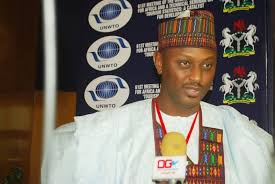Culture and Tourism
Kangiwa Hails FG For Introduction Of Tourism Subject In Secondary Schools

Joel Ajayi
The Director-General of the National Institute for Hospitality and Tourism, (NIHOTOUR), Alhaji Nura Sani Kangiwa has expressed his delight with the Federal Government’s directives for the introduction of tourism in the curriculum of secondary schools in the country.
Alhaji Kangiwa who made this known while declaring open a Train the Trainer program for teachers of tourism in the Federal Capital Territory organized by the Institute in Abuja, said tourism remains one of the world’s biggest employer of labour and a substantial contributor to the GDP of most countries.
He said giving Government’s renewed interest to diversify the economy and tourism as one of the considered sectors for diversification, there was no better time than now to groom the youth into taking interest in tourism as a professional course of studies, as well as to urge them to venture into the sector as key players on self-employment basis.
The Director General noted that with the present spate of youth unemployment resulting into youth restiveness tourism as a service industry has the capacity to offer employment opportunities to our teeming youths, stimulate Nigeria’s economic growth, generate foreign exchange and contribute to domestic earnings through fees and taxes
Speaking further, Kangiwa said The National Institute for Hospitality and Tourism has the mandate to provide skills proficiency, technical upgrading programmes and professional knowledge based education in the Hospitality and Tourism Industry in Nigeria, calling on all interested individuals, practitioners and stakeholders to seize the opportunity of enrolling for the Institute’s programs in one or more of its campuses in the six geopolitical zones of the country including Abuja, the Federal Capital Territory.
Participants at the Train the Trainer program who were drawn from selected secondary schools in the Federal Capital Territory, Abuja expressed their delight with the training as, according to them, they will be better equipped to teach tourism as a subject and impact their students with better knowledge of the subject
Creative Industry
Experts Urge Collaborative Training and Investment to Propel Nigeria’s Tourism and Transportation Industry at NTTSummit 2025

Joel Ajayi
The 8th edition of the National Tourism Transportation Summit and Expo has concluded in Abuja with a strong call for the integration of entrepreneurship development, skills acquisition and capacity-building programmes into the national policy framework for the tourism and transportation sectors.
According to the communique issued at the end of the two-day summit, stakeholders emphasized that such initiatives are essential for empowering youth and women, equipping them with the practical skills required to enter the industry, and stimulating investment through effective collaboration among training and capacity-development institutions. This, they noted, is critical for advancing the growth of Nigeria’s travel, tourism, hospitality and transportation sectors.
The communique further highlighted the need for strengthened cooperation among key public and private sector players, including the Nigerian Tourism Development Authority (NTDA), the National Board for Technical Education (NBTE), certification bodies, and leading training institutions such as NIHOTOUR and NCAT.
This collaboration, stakeholders said, is vital for enhancing service quality and aligning operations with global best practices.Participants also underscored the importance of standardizing operational guidelines across the tourism and transportation value chain, increasing investment in transportation infrastructure, and developing tourist destinations through public-private partnerships built on strong synergistic frameworks.
On tourism development, the summit stressed the need for a renewed focus on community-based tourism at the grassroots level, where most of Nigeria’s tourism wealth is located. It urged the federal and state governments to work closely with local governments and community leaders to upgrade tourist sites, strengthen heritage management and empower local stakeholders to drive tourism business sustainably.
The communique also called for the revitalization of Local Government Tourism Committees to ensure inclusive participation in tourism activities. It emphasized the importance of developing quality infrastructure—especially transportation, described as the “lifeline of the industry”—to enhance the tourism value chain, stimulate local economies, and promote cultural preservation and national heritage.
The resolutions emerged from expert presentations and panel discussions aligned with the Summit’s theme: “Tourism–Transportation Connectivity: Accelerating Synergy for National Socio-Economic Growth and Development.”
Speakers addressed key sub-themes including:Standards and Policies for Sustainable Tourism and Transportation DevelopmentDriving Economic Growth through Private Sector ParticipationDestination Development and Human Capital Capacity Building.
Community-Based and Inclusive Tourism for Social Integration and EmpowermentUnlocking Investment Opportunities in Tourism Transport Corridors
Sustainable Marine Resource Management for Blue Economy Growth.
Participating organizations and agencies that presented papers at NTTSummit 2025 included: the Nigerian Tourism Development Authority (NTDA), National Institute for Hospitality and Tourism (NIHOTOUR), Nigerian Shippers’ Council (NSC), National College of Aviation Technology (NCAT), Nigeria Investment Promotion Commission (NIPC), and the Chartered Institute of Transport Administration (CIoTA), among others.
-

 Featured6 years ago
Featured6 years agoLampard Names New Chelsea Manager
-

 Featured6 years ago
Featured6 years agoFG To Extends Lockdown In FCT, Lagos Ogun states For 7days
-

 Featured6 years ago
Featured6 years agoChildren Custody: Court Adjourns Mike Ezuruonye, Wife’s Case To April 7
-

 Featured6 years ago
Featured6 years agoNYSC Dismisses Report Of DG’s Plan To Islamize Benue Orientation Camp
-

 Featured4 years ago
Featured4 years agoTransfer Saga: How Mikel Obi Refused to compensate me After I Linked Him Worth $4m Deal In Kuwait SC – Okafor
-
Sports3 years ago
TINUBU LAMBAST DELE MOMODU
-

 News11 months ago
News11 months agoZulu to Super Eagles B team, President Tinubu is happy with you
-
Featured6 years ago
Board urges FG to establish one-stop rehabilitation centres in 6 geopolitical zones
